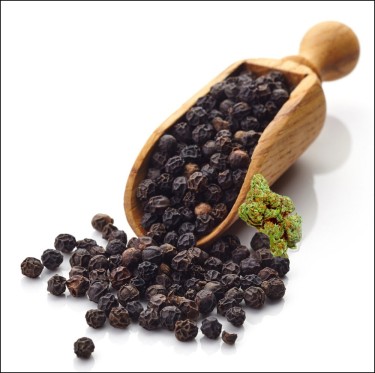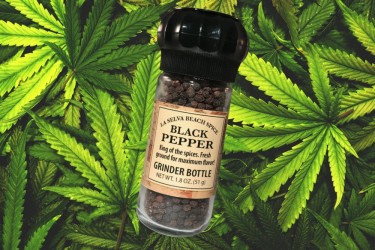
As the cultural and legal landscape around cannabis continues to evolve, many users and researchers are interested in finding natural ways to manage and mitigate the side effects of its use. One such remedy that has garnered attention is black pepper. This seemingly simple kitchen spice is reputed to help alleviate some of the less desirable effects of cannabis, such as paranoia and anxiety. This article explores the scientific basis behind this claim, outlines how black pepper might interact with cannabis, and provides detailed insights into practical applications.
Understanding the Chemistry of Cannabis and Black Pepper
Cannabis contains various compounds, including THC (tetrahydrocannabinol), which is primarily responsible for its psychoactive effects. However, the experience can sometimes be overwhelming, leading to adverse effects such as:
Black pepper contains terpenes like beta-caryophyllene (BCP), which may interact positively with cannabis cannabinoids. BCP, a non-psychoactive dietary cannabinoid, binds to CB2 receptors in the endocannabinoid system. This interaction could explain how black pepper reduces THC’s psychoactive effects, providing a theoretical basis for this mitigating effect.
The Role of Terpenes in Cannabis and Black Pepper
Terpenes play a significant role in both cannabis and black pepper, contributing to their aromas, flavors, and therapeutic effects. Understanding these compounds is essential to grasping how black pepper might manage the effects of cannabis.
-
Terpenes in Cannabis
Cannabis plants produce a wide variety of terpenes, which are aromatic compounds that contribute to the plant’s distinctive smell and flavor. These terpenes also have therapeutic properties and can influence the overall effects of cannabis. Key terpenes found in cannabis include:
-
Myrcene: Known for its musky, earthy scent, myrcene has sedative effects and is believed to enhance the psychoactive effects of THC.
-
Limonene: With a citrusy aroma, limonene is thought to elevate mood and provide stress relief.
-
Pinene: Smelling like pine, pinene is associated with alertness and memory retention.
-
Linalool: Found in lavender, linalool has a floral scent and is known for its calming and anti-anxiety properties.
-
Beta-caryophyllene: This spicy, peppery terpene also interacts with the endocannabinoid system and is unique because it can bind directly to CB2 receptors, influencing inflammation and pain.
-
Terpenes in Black Pepper
Black pepper is also rich in a diverse array of terpenes, with beta-caryophyllene (BCP) being the most prominent and noteworthy among them. What sets beta-caryophyllene apart is its unique ability to function as a dietary cannabinoid, meaning it has the capacity to interact with the endocannabinoid system in a way that is both significant and beneficial. Specifically, beta-caryophyllene has been shown to bind selectively to CB2 receptors, which are an integral part of the endocannabinoid system and are closely tied to anti-inflammatory effects, without producing any psychoactive responses or “high” associated with CB1 receptors. This makes beta-caryophyllene a particularly interesting and valuable compound, with potential therapeutic applications in the realm of inflammation and beyond. The major terpenes in black pepper include:
-
Beta-caryophyllene (BCP): This terpene can bind to CB2 receptors and may help mitigate the psychoactive effects of THC, providing a balancing effect on the endocannabinoid system.
-
Piperine: Responsible for black pepper’s pungency, piperine enhances the bioavailability of other compounds, potentially making them more effective.
-
Pinene: Also found in cannabis, pinene in black pepper can aid in respiratory function and has anti-inflammatory properties.
-
Limonene: Sharing its presence with cannabis, limonene in black pepper contributes to its citrusy note and has mood-enhancing effects.
How Black Pepper Interacts with Cannabis
The interaction between the terpenes in cannabis and those in black pepper, particularly beta-caryophyllene, can influence the effects of cannabis consumption. The potential benefits include:
-
Reduction of Anxiety and Paranoia: Beta-caryophyllene’s binding to CB2 receptors might help counteract the anxiety and paranoia that can accompany high THC consumption.
-
Modulation of Psychoactivity: By interacting with the endocannabinoid system, beta-caryophyllene may help reduce the intensity of THC’s psychoactive effects, providing a more balanced experience.
-
Enhanced Therapeutic Benefits: The combination of terpenes from both plants can enhance the overall therapeutic benefits due to their synergistic effects.
Practical Ways to Use Black Pepper to Manage Cannabis Effects
For cannabis users interested in exploring the potential benefits of black pepper to manage effects, there are several practical methods:
-
Inhalation: Sniffing or inhaling the aroma of crushed black peppercorns could provide immediate relief from cannabis-induced anxiety or paranoia.
-
Oral Consumption: Adding black pepper to food or consuming peppercorns directly can help integrate beta-caryophyllene into the body, potentially mitigating adverse effects.
-
Aromatherapy: Using black pepper oil in a diffuser may help by providing a steady amount of beta-caryophyllene in the environment.
Research and Evidence
The relationship between black pepper and cannabis effects is still under-researched, with most of the evidence being anecdotal or derived from preliminary studies. Important points include:
-
Anecdotal Reports: Many users have reported relief from cannabis-induced side effects through the use of black pepper.
-
Scientific Studies: Research on beta-caryophyllene, particularly its potential to reduce inflammation and anxiety through CB2 activation, supports the idea that it could help manage THC effects.
Considerations and Cautions
While black pepper may offer a natural way to manage some effects of cannabis, users should consider several factors:
-
Personal Differences: Individual reactions can vary based on body chemistry, the strain of cannabis used, and personal health conditions.
-
Underlying Health Issues: Those with health issues should consult with a healthcare provider before using black pepper as a remedy for cannabis effects.
Conclusion
The interaction between black pepper and cannabis offers a fascinating example of how natural substances can potentially interact with human biology in complex and beneficial ways. This relationship underscores the importance of understanding the intricate biochemistry involved in the human body’s response to various compounds found in both cannabis and common spices like black pepper. The key compound in black pepper, beta-caryophyllene (BCP), has shown promise in modulating the effects of THC, the primary psychoactive component in cannabis. BCP’s ability to selectively bind to CB2 receptors in the endocannabinoid system—without producing psychoactive effects—presents a compelling theoretical basis for its use in managing the often overwhelming psychoactive effects of THC. This interaction suggests that black pepper could help reduce THC-induced anxiety, paranoia, and cognitive impairment, providing a more balanced and manageable cannabis experience.
MORE ON BLACK PEPPER FOR CANNABIS USE, READ ON..
BREAK THE PEPPER OUT FOR TOO MUCH CANNABIS INTAKE?
- SEO Powered Content & PR Distribution. Get Amplified Today.
- PlatoData.Network Vertical Generative Ai. Empower Yourself. Access Here.
- PlatoAiStream. Web3 Intelligence. Knowledge Amplified. Access Here.
- PlatoESG. Carbon, CleanTech, Energy, Environment, Solar, Waste Management. Access Here.
- PlatoHealth. Biotech and Clinical Trials Intelligence. Access Here.
- Source: http://cannabis.net/blog/medical/is-the-solution-to-highthc-products-and-potent-marijuana-strains-good-oldfashioned-black-pepper




